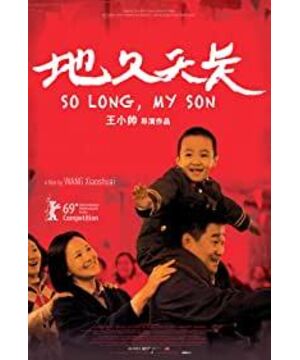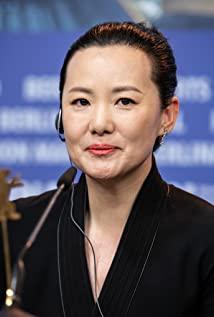1
The two episodes in "Long Time" left the deepest impression on me. First, at the end of the film, Li Haiyan passed away. At the dinner after the memorial service, Li Yun pointed to Li Haiyan's daughter-in-law's pregnant belly and asked, "How many months old?"
Afterwards, she said quietly: "It's a pity that Haiyan can't see it anymore."
It was then that I suddenly saw the complexity of this character.
Is it possible to have no hatred at all because of the pain of losing children twice because of the same family?
I do not believe.
This hatred must exist, but the sad thing is that there is no way to get rid of it.
Because the "enemy's family" has been friends for many years, because it is the work of the "enemy" to engage in family planning, and because the death of one's own child was caused by another child's mistake.
All these reasons together make this hatred can only be endured and cannot be erupted.
Until Li Haiyan passed away, he could not see the birth of his grandson. This ending also made Li Yun, who had been in hatred for many years, finally let out a sigh of relief.
In that tone, there was a small pleasure of revenge, and there was also a sense of relief from the impermanence of fate.
Another memorable plot is what Liu Yaojun said to his adopted son when he came back to get his ID card.
The general idea is: Mom and Dad want to thank you, you have been raising you as a star for so many years, and you have always treated yourself as a star to make us happy. From now on, when you hang out outside and get bullied, don't forget how I hit you.
There is also hatred behind this sentence.
Liu Yaojun's mentality is: We raised you so much, you have no kindness at all, and you are leaving us now. Well, I'll tell the truth, for so many years, you are just a substitute for our dead child Liu Xing, and we have never regarded you as yourself.
In fact, this is very cruel. It completely pierces the last layer of window paper that maintains the dignity of the family. So the room for manoeuvre supported by lies disappeared, and after that, only old age and death remained.
Why do these two hateful plots impress me so deeply?
Because of them, I really believed in the authenticity of Liu Yaojun and Wang Liyun.
If we take them off, we see the images of two supremely good saints who, in order to bear the mistakes of others, banished themselves into distant places, living a life of misery and hopelessness, and without hatred.
I really don't know how to accept the existence of such a character.
Maybe my consciousness is too low.
Perhaps even the above two plots are all imaginary because I expected too much hatred to appear.
If that's the case, then all I can say is: I'm sorry, I really don't understand them.
2
A lot of people say "Long Time" is a civilian epic, I can't agree.
All I can say is that it's a work with "epic ambitions", but it's not epic.
So what is an epic?
It's not that as long as it's long enough and spans long enough, it's epic.
The real essence of an epic is to present the traces that the times have run over people.
This trace is not external, not the change of clothing, the grayness of the hair or the accumulation of wrinkles on the face, but the reaction of the character's mental state to the changes of the times.
I didn't see such a reaction in "Long Time".
Although the film has intersections with many "events of the times", such as: going to the mountains and the countryside, family planning, crackdowns, layoffs...
But what is their impact on the characters?
can not see.
They only appear briefly like a headline party, attracting the attention of the viewer, but click to view the text, but the words are not detailed.
The experience of going to the mountains and the countryside left only a song called "Friendship Lasts for a Long Time"; the crackdown made my friend Xinjian go to jail, but the impact on the protagonist was minimal; the impact of being laid off was only exchanged for Liyun's tears and Turned around and left, and was nowhere to be found again; even the family planning policy that hit the protagonist the hardest, the child was gone, and it was rated as advanced because of this, which is quite absurd. But at the root, what really caused the tragedy of the protagonist was not the cause of any era, but just a family tragedy. It was the other party's child who killed his own child.
It should be said that this is a completely "short of parents" type of tragedy.
Although Wang Xiaoshuai put it in a long enough time to digest, this tragedy perfectly avoided all the crux of the times and became a solitary existence.
This is where I felt the most uncomfortable when watching "Long Time".
It felt like a bull's knife was used to kill a chicken, and there was a sense of big and unworthy failure.
Of course, I'm not saying that "the pain of losing a child" is not painful enough, of course not. It's just that you circled around a lot and put on a full posture, as if the times did something, but it turned out that it wasn't. In the end, it was still a simple reservoir drowning. death event.
I can't help but ask, the film spans decades and has a full 175 minutes, is it really just that?
Going back to what I just said, the real sense of epic is to show the traces of the times that have run over people.
It's not that we haven't made good civilian epic works. Let's not talk about the sixth generation. There are Lu Xuechang's "Growing Up", Jia Zhangke's "Platform" and Lou Ye's "Summer Palace".
"Growing Up" is about the disillusionment of an idealist in the era of commodity economy.
The film follows the protagonist from the late 1970s to the late 1980s, just from the end of the scars of one era to the beginning of the scars of another era. When the spirit of the times declines, everyone quickly surrenders to the material, and the idealists are bound to perish.
"Platform" is about the loss of a group of literary and artistic youths in the small town of Fenyang.
They thought they were standing at the center of the stage, and did not want the tide of the times to come. These young people who were not good at tide-making were washed away by the big waves and barely survived on the shore, but they could not stop the fate of being marginalized.
"Summer Palace" is about college students in Beijing, who experienced the death of their souls in that turmoil, and only their bodies are still struggling to survive.
The film uses sex and love to describe the changing times of the times. If the body corresponds to the material and the soul corresponds to the spirit, then you will know exactly what has risen and what has come to an end after the turmoil.
Looking back at "Long Time", you will understand that it is just catching the heat of the times. Although the film is full of age from the props to the set, the characters are always drifting outside the times.
Accompanying them, from beginning to end, there is only the pain of losing a child, and there are no scars of the times.
Therefore, no matter how big the battle is, it is only an extension of "ethical romance films" such as "Left and Right" and "Rizhao Chongqing".
It's not epic, it's just a period drama that's miniature from length to format.
3
Finally, let's talk about the "happy" ending of the film.
Very unsightly, right?
Here I want to clarify that it does not mean that a "happy reunion" ending must be bad, and a tragic ending must be high-level, that's not the case.
The more critical question is what exactly the director wants to express, which determines where it will be placed.
What is the meaning of "Long Time"?
I am not sure.
It's just a muddled account of wanting everything and saying nothing in the end.
After watching the first half, I thought that the film would end up on the theme of "friendship", otherwise the melody of "Friendship Is Everlasting" would not sound repeatedly.
If I remember correctly, this song appeared three times.
Once at Yaojun's house, when he was secretly gathering, once at a dance, and once when it was simply passive music. In the hospital, it rang for no reason when rescuing Liu Xing.
If the first two times can roughly hold the theme of "friendship", what is the paragraph about rescuing Liu Xing? Irony? inexplicably.
What's more, the song disappears completely in the second half of the film.
So is the theme "reconciliation"?
It looks like it, but after careful consideration it is not.
If it is a reconciliation, who is reconciling with whom?
No, this story is about "can't bear to blame" from the beginning, but the director disrupted the chronological order through editing, making people mistakenly think that this is a reconciliation story.
Actually not. Because in the beginning, the hatred was not forged, and there was no reconciliation.
When it comes to reconciliation, only Haohao's character completes self-redemption by confessing to Yaojun and his wife at the end of the film.
But Haohao is not the subject of the narrative.
I also heard many people say that this is a movie about "being alive".
When it comes to "alive", it is natural to think of "alive".
Compare the two films and you can see the difference.
After experiencing a series of heavy losses in life, the protagonist of "Alive" did not wait for a better or even a slightly better future. He will continue to be there, and suffering may continue to come. The essence of living is to live not for beauty but to live.
On the other hand, in the happy ending of "Long Time, Long Day", after the passage of time, the enemy died, the child who made the mistake admits it, the adopted son also came back, and the derailment has subsided... After a long wandering, Liu Yaojun and Wang Liyun finally A better future awaits them, and this is life's reward for them.
This is already out of the original meaning of "living", but taking "living" as a means and happiness as a reward.
If you want to use "living" as the theme, it is obviously more appropriate to stop at the scene of "going to the grave". After many years, the old couple will return to their hometown and make a tribute to the past, but their wandering life will continue.
When a director can't figure out where the film will go, it's most fun to resort to a happy ending.
No one has to owe, no one has to offend, but the result of not owed or offended is that nothing is said, and all the sorrows and reflections that have just emerged are instantly dissipated.
Wang Xiaoshuai said in an interview that the film is about: as long as time is long enough, impermanence will appear.
But I think it's better to say: as long as you live long enough, you will definitely be able to wait for a good day.
Maybe this is the meaning of "Long and Long"?
4
One last word.
Wang Xiaoshuai is a very stubborn person. Although frankly speaking, he may really be a director who is not talented enough, but his persistence in self-expression is still worthy of recognition.
Over the years, he has always honestly talked about the topics he is concerned about, and his exploration of the history of the third line is also worthy of admiration.
He is better than Jia Zhangke when it comes to asserting himself.
Even if the reason behind it is because he cannot go beyond his own limitations, at least from the results, he is a persistent director.
In this day and age, is anyone still making this type of film?
I racked my brains to think about it, and it seems like it's gone.
For this reason, we should also treat Wang Xiaoshuai a little better.
View more about So Long, My Son reviews










